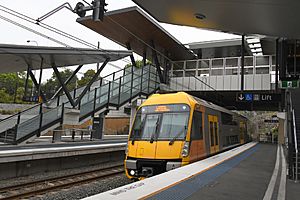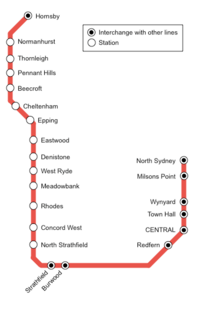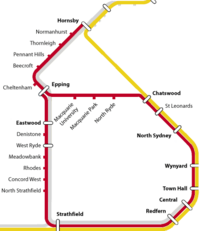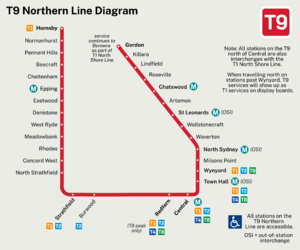Northern Line (Sydney) facts for kids
Quick facts for kids Northern Line |
|||||||||||||||
|---|---|---|---|---|---|---|---|---|---|---|---|---|---|---|---|
 |
|||||||||||||||

An A set at Cheltenham station
|
|||||||||||||||
| Overview | |||||||||||||||
| Service type | Commuter rail service | ||||||||||||||
| Status | Active | ||||||||||||||
| Locale | Sydney | ||||||||||||||
| Current operator(s) | Sydney Trains | ||||||||||||||
| Route | |||||||||||||||
| Line used |
|
||||||||||||||
| Technical | |||||||||||||||
| Rolling stock | T, H, A and B sets | ||||||||||||||
| Timetable number(s) | T9 | ||||||||||||||
|
|||||||||||||||
The Northern Line is a train service in Sydney, Australia. It's known as T9 and is shown in red on train maps. This line helps people travel between Sydney's Inner West and Northern suburbs. It became its own separate line in April 2019. Before that, it was part of a bigger line called the T1 North Shore, Northern & Western Line. The T9 line is also a bit like an older Northern Line that ran until 2013.
Contents
History of the Northern Line
How the Line Started (until 2013)
The original Northern Line was part of the Main North railway line. This section, from Strathfield to Hornsby, opened in 1886. It became an electric train line in 1926. When the Sydney Harbour Bridge opened, it connected this line to the North Shore line. This meant trains could travel across the Harbour Bridge.
Passenger trains used to be called the Main North Line. They were shown in red on train maps. These trains went all the way to Cowan. In 1992, the service stopped at Berowra instead. Later, this line and the North Shore Line (which was yellow) formed a continuous loop. This loop went through Strathfield, Epping, and back to Hornsby.
Later on, the line was simply called the Northern Line. It ran from Hornsby to North Sydney, going through Strathfield and the City. In 2009, a new train link opened between Epping and Chatswood. The Northern Line then connected with this new link. This split the traditional Northern Line into two parts. Trains from north of Epping used the new link. They then went to the city via the North Shore Line.
Part of T1 (2013 to 2019)
In October 2013, the Northern Line joined two other lines. These were the North Shore Line and the Western Line. Together, they formed a new, bigger line called the T1 North Shore, Northern & Western Line. This combined line was shown in yellow on maps.
During weekdays, trains from the upper Northern Line (Hornsby via Macquarie University) connected with Western Line trains. These trains went towards Richmond or Emu Plains. Trains from the lower Northern Line (Epping via Strathfield) joined North Shore Line trains. These went towards Hornsby or Berowra. On weekends, trains ran more like they did before the merger.
In September 2018, the Epping to Chatswood line closed. This was to change it for the new Sydney Metro Northwest project. Because of this, the traditional Northern Line route was brought back. This route went from Hornsby to Central via Strathfield.
The New T9 Northern Line (since 2019)
On April 28, 2019, the Northern Line became its own separate line again. It was now called the T9 Northern Line. This happened as part of the changes for the Sydney Metro Northwest. The new T9 line runs from Hornsby to Gordon and back. It follows a route very similar to the line before 2009. It is also coloured red on train maps, just like it used to be.
In September 2023, the T9 line became special. It was the first train line in Sydney to be fully accessible for wheelchairs. This was after the upgrade of Denistone station was finished.
What Route Does the T9 Northern Line Take?
The T9 line starts at Hornsby station. This is a station where the North Shore Line also runs. The line then goes south to Strathfield, passing through Epping. It uses the Main North Line for this part of the journey. Trains cross the Parramatta River between Rhodes and Meadowbank. At Strathfield, trains usually go over other tracks. They then head east onto the Main Suburban Railway.
Trains pass through Redfern and Central stations. Then they go through the western part of the City Circle. After that, they cross the Sydney Harbour Bridge. Trains then head north along the North Shore towards Gordon. From Gordon, these trains continue as T1 North Shore line trains. They can go to Hornsby or Berowra.
During off-peak times and on weekends, the T9 usually makes a full loop. It goes from Hornsby to Hornsby or Berowra (anti-clockwise) and back. However, during busy morning and afternoon times, the route changes. It has two different stopping patterns:
Anti-clockwise direction:
- All stations from Hornsby to Epping. Then Eastwood, West Ryde, Meadowbank, Rhodes, Strathfield, Burwood. Finally, it stops at Central (Grand Concourse).
- All stations from Epping to Strathfield. Then Redfern, Central. After that, all stations to Gordon. Then all stations to Hornsby or Berowra (continuing as T1 North Shore line).
Clockwise direction:
- All stations from Berowra or Hornsby or Lindfield to Redfern. Then Strathfield. After that, all stations to Epping.
- Central (Grand Concourse). Then Burwood, Strathfield, Rhodes, Meadowbank, West Ryde, Eastwood, Epping. Finally, all stations to Hornsby.
The journey from the Northern Line to Redfern station is officially called T9. But from Central station onwards, the screens often show these trains as T1. This is even if they started on the Northern Line. However, at stations from Hornsby to Redfern (via Strathfield), announcements say T9 services go to Gordon. They also say the service then "continues to T1 North Shore line."
| Name | Distance from Central |
Opened |
Railway line | Serving suburbs | Other lines |
|---|---|---|---|---|---|
| Gordon | 17.1 km | 1890 | North Shore | Gordon | |
| Killara | 15.9 km | 1899 | Killara, East Killara | ||
| Lindfield | 14.6 km | 1890 | Lindfield, East Lindfield | ||
| Roseville | 13.3 km | 1890 | Roseville | ||
| Chatswood | 11.7 km | 1890 | Chatswood |
M
|
|
| Artarmon | 10.3 km | 1898 | Artarmon | ||
| St Leonards | 8.4 km | 1890 | St Leonards, Naremburn, Crows Nest, Greenwich, Artarmon |
||
| Wollstonecraft | 7.2 km | 1893 | Wollstonecraft, Greenwich | ||
| Waverton | 6.1 km | 1893 | Waverton | ||
| North Sydney | 5.1 km | 1932 | North Sydney | ||
| Milsons Point | 4.4 km | 1932 | Milsons Point, Kirribilli | ||
| Wynyard | 2.1 km | 1932 | Sydney CBD, Barangaroo |
T3
T8
|
|
| Town Hall | 1.2 km | 1932 | Sydney CBD |
T3
T4
T8
|
|
| Central | 0 km | 1855 | Haymarket, Chippendale, Ultimo, Surry Hills |
||
| Redfern | 1.3 km | 1878 | Main Suburban | Redfern, Waterloo, Darlington, Eveleigh |
T3
T4
T8
(T8 peak hours only) |
| Burwood | 10.6 km | 1855 | Burwood | ||
| Strathfield | 11.8 km | 1876 | Strathfield, Burwood | ||
| North Strathfield | 13.4 km | 1918 | Main North | North Strathfield, Concord West, Concord, Homebush |
none |
| Concord West | 14.5 km | 1887 | Concord West, Liberty Grove, Concord | ||
| Rhodes | 16.6 km | 1886 | Rhodes, Liberty Grove | ||
| Meadowbank | 18.2 km | 1887 | Meadowbank, West Ryde, Ryde |
||
| West Ryde | 19.2 km | 1886 | West Ryde, Denistone | ||
| Denistone | 20.2 km | 1937 | Denistone, Denistone East, Denistone West, West Ryde |
||
| Eastwood | 21.4 km | 1886 | Eastwood | ||
| Epping | 23.4 km | 1886 | Epping |
M
|
|
| Cheltenham | 26.8 km | 1898 | Cheltenham | none | |
| Beecroft | 28.3 km | 1886 | Beecroft | ||
| Pennant Hills | 30 km | 1886 | Pennant Hills | ||
| Thornleigh | 30.8 km | 1886 | Thornleigh, Pennant Hills, Westleigh | ||
| Normanhurst | 33.1 km | 1895 | Normanhurst, Thornleigh, Hornsby | ||
| Hornsby | 35.3 km | 1886 | Hornsby, Waitara |
How Many People Use the T9 Line?
This table shows how many people used the T9 line up to June 30, 2022.
| 57 173 000 | ||
| 32 462 000 | ||
|
T3
|
16 580 000 | |
|
T4
|
38 199 000 | |
|
T5
|
5 052 000 | |
|
T7
|
657 000 | |
|
T8
|
21 503 000 | |
|
T9
|
14 488 000 |
 | Janet Taylor Pickett |
 | Synthia Saint James |
 | Howardena Pindell |
 | Faith Ringgold |




